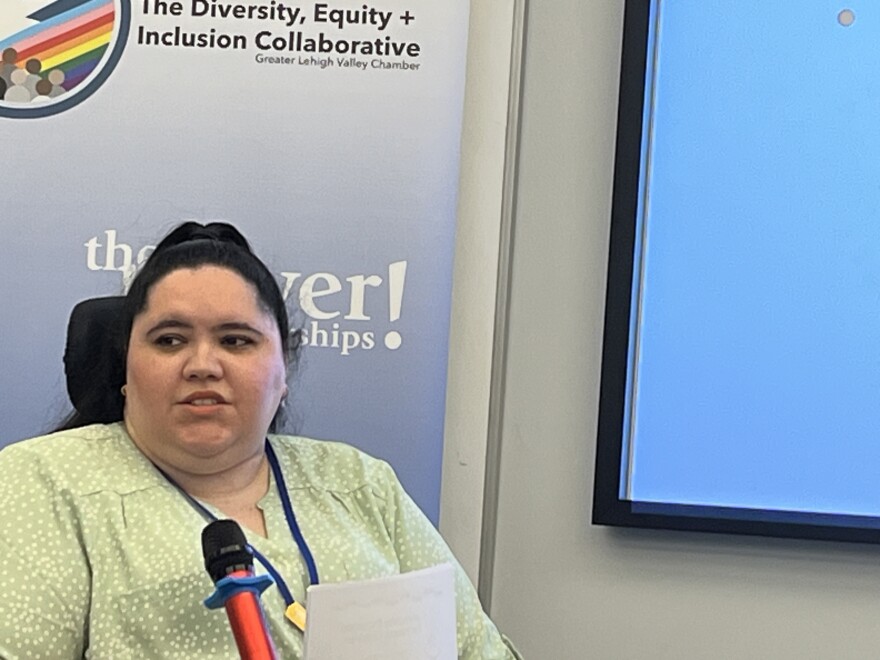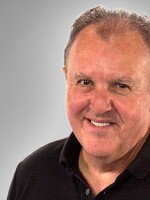BETHLEHEM, Pa. — Fate can be cruel and relentless, detouring one’s dreams from well-paved highways onto unlit, uneven sideroads.
Julianna Rodrigues knows.
One minute, she was a 16-year-old Bethlehem Catholic student playing volleyball and basketball and dreaming of becoming a lawyer to help people.
The next, she was undergoing endless medical tests, hoping to learn why the broken foot she suffered while in the school marching band was not healing properly.
The mission of the Lehigh Valley Chamber of Commerce’s Diversity, Equity and Inclusion Collaborative is one of empathy-building and intersectionality, with the goal of driving change toward greater diversity throughout the Lehigh Valley.Lehigh Valley Chamber of Commerce
Five long years later, Rodrigues learned why.
She was diagnosed with limb-girdle muscular dystrophy type 2B, a rare genetic disorder that causes muscle weakness in the arms, legs, shoulders and pelvic girdle.
The irony was unmistakable. There was Rodrigues on Tuesday morning at the inaugural Greater Lehigh Valley Chamber of Commerce Diversity, Equity and Inclusion Collaborative at Moravian University, in a wheelchair explaining in illuminating detail how folks with disabilities can stand up for themselves.
The mission of the Chamber’s Diversity, Equity and Inclusion Collaborative is one of empathy-building and intersectionality, with the goal of driving change toward greater diversity throughout the Lehigh Valley.
'Focus on person, not disability'
Rodrigues was keynote speaker at the 60-minute event titled, “Empowering Abilities: Disability Inclusion in the Workplace.”
“Becoming a lawyer was my goal back then,” she said.
“However, after going through the process with my health, I realized I really liked helping people. I liked advocating for people with disabilities.
"I found out that was where my passion was, so I decided to change course, to go into a field to help and support people.”
“The easiest way is to focus on the person, not the disability."Julianna Rodrigues
Rodrigues, 33, does just that. She is project assistant for the nonprofit Community Inclusion for Young Children program at the Lehigh Valley Center for Independent Living in Allentown.
The group helps build awareness and supports those willing to create strategies for disability inclusion in the workplace.
She also serves as administrative assistant for the Pennsylvania Council on Independent Living, with the responsibility to assist within the statewide coalition project and advocacy group.
Rodrigues has a master’s degree in rehabilitation counseling from Assumption University in Massachusetts and bachelor’s degree in political science from Moravian.
Rodrigues moderated a video presentation outlining the challenges those with disabilities face in the workplace, such as interpersonal challenges; biases and misunderstandings regarding physical, cognitive, intellectual, sensory and psychiatric issues; and structural mobility issues.
“It’s important not to assume things and not judge people,” Rodrigues said. “You could be sitting next to someone with a disability.
“The easiest way is to focus on the person, not the disability. We need to challenge stereotypes. All of this matters because these are human rights — the right to work and participate fully in society.”
'I choose to educate'
Disabilities affect more than 1 billion people worldwide and 61 million, or 1 in just over 5, in the United States. where almost 19 million workers have a disability.
“People with disabilities are a part of everyday life,” Rodrigues said.
Asked how she reacts to people she encounters who are insensitive to her disability, Rodrigues said she views those encounters as an educational opportunity.
“In any situation like that, I choose to educate,” she said. “I explain my situation and use it as an opportunity to have a conversation.”
“They are welcoming and friendly there. We work as a team and they make sure each employee is available to assist us and make us feel respected. They treat us as if our disability does not exist.”Ashley Peavy, an employee with disabilities at Bitty & Beau’s Coffee in Bethlehem
Ashley Peavy is an employee with disabilities at Bitty & Beau’s Coffee in Bethlehem. She shared her experiences working at that business, where people with intellectual and developmental disabilities are valued in the workplace.
“They are welcoming and friendly there,” she said. “We work as a team and they make sure each employee is available to assist us and make us feel respected.
“They treat us as if our disability does not exist.”
Bitty & Beau’s employs more than 400 people with disabilities nationwide.
Rodrigues underscored the advantages of hiring a diverse workforce to help the business get unique perspectives, which can change current thinking and generate innovative ideas.
Hiring people with disabilities affords them the opportunity to shine in the workplace.
Fate can be cruel and relentless, detouring one’s dreams from well-paved highways onto unlit, uneven sideroads.
But as Rodrigues showed, in life, there's more than one way to get where you want to go.


